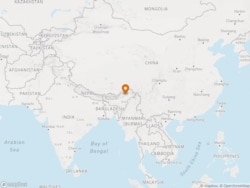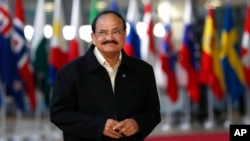Days after talks to resolve a 17-month military standoff between India and China stalled, the Asian rivals are involved in a new war of words over a recent visit by the Indian vice president to Arunachal Pradesh, a state in eastern India claimed by China.
The exchanges indicate deepening tensions between the two countries, which have bolstered troops massively along disputed stretches of their Himalayan border according to security experts.
After Beijing raised objections to Vice President M. Venkaiah Naidu’s visit over the weekend to the remote Himalayan state, India reacted sharply, calling Arunachal Pradesh “an integral and inalienable part of India.”
“Indian leaders routinely travel to the state of Arunachal Pradesh as they do to any other states of India. Objecting to the visit of Indian leaders to a state of India does not stand to reason and understanding of the Indian people, " Indian foreign ministry spokesperson Arindam Bagchi said.
Earlier on Wednesday Chinese foreign ministry spokesperson Zhao Lijian told a press briefing that China “firmly opposed” the visit of the Indian leader and called on New Delhi “to stop taking actions that would complicate and expand the boundary issue.”
He urged India to respect China’s concerns and take “real actions” to maintain peace and stability in border areas.
Arunachal Pradesh lies in eastern India, away from Ladakh in the western Himalayas where troops from both sides have been locked in a faceoff. But security analysts have warned that it could also become a flashpoint -- its status has long been a disputed matter, with Beijing claiming it as a part of south Tibet.

This is not the first time that China has raised objections to the visit of an Indian leader to Arunachal Pradesh. In 2017 it also denounced a trip by Tibetan spiritual leader, the Dalai Lama, to the region.
China voiced objections to the Naidu’s visit two days after the two countries hardened their postures following a breakdown in negotiations between their military commanders that aim at disengaging the tens of thousands of troops massed by them in Ladakh.
Indian foreign ministry spokesperson Arindam Bagchi said that the situation in Ladakh has been caused “by unilateral attempts of the Chinese side to alter the status quo in violation of the bilateral agreements.”
"We expect the Chinese side to work towards early resolution of the remaining issues along the LAC [the Line of Actual Control, the de facto border between the two countries] in Eastern Ladakh while fully abiding by bilateral agreements and protocols rather than trying to link unrelated issues,” he said, a reference to China’s comment on the India’s leader visit to Arunachal Pradesh.
Both sides have blamed each other for the stalemate in their talks, with China saying that India made “unreasonable and unrealistic demands, while India had said that the Chinese side was not agreeable to its “constructive suggestions.”
In an editorial after the breakdown in their negotiations, The Indian Express newspaper pointed to the increasing trust deficit between the two countries and said that the “challenge for India is to keep pushing China for a broader resolution of the boundary question via talks and equip the military better to stand guard at the LAC.”
Last week, India’s army chief, M.M. Naravane, said that the large-scale buildup of troops and infrastructure by the Chinese along the border “means that they are there to stay” and added that “if they are there to stay, we are there to stay too.”




